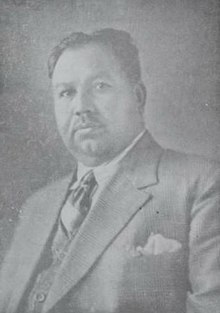Mohammad Farrokhi Yazdi
Mohammad Farrokhi Yazdi | |
|---|---|
 | |
| Born | 1889 |
| Died | October 18, 1939 (aged 49–50) |
| Nationality | Iranian |
| Occupation(s) | poet, journalist and senior politician |
| Political party | Socialist Party[1] |
Mirza Mohammad Farrokhi Yazdi (Persian: میرزا محمد فرخی یزدی; 1889 – October 18, 1939), also known as Taj osh-Sho'arā (تاج الشعرا), was an Iranian poet, journalist and senior politician of the Persian Constitutional Revolution and the Reza Pahlavi era.
Biography[edit]
Born in Yazd and his father was Mohammad Ebrahim Yazdi, he started his preliminary education in Yazd until the age of 16 when he was expelled from school for his poems against school teachers and principal.
By the age of 16, he had already started writing poetry and gradually became active during the Persian Constitutional Revolution and was imprisoned because of writing material in opposition to the infamous 1919's Anglo-Persian Agreement. In prison, he protested that "He whose only offense is love of the motherland / No creed would condemn to a dark cell...".
Farrokhi Yazdi composed a poem criticizing Zeygham al-Dawla Qashqa'i, the ruler of Yazd, and in response Zeigham al-Dawla ordered to sew his mouth with thread and needle and throw him in prison.[2] In 1921, he published the political newspaper Toufan (storm), winning fame for his poetry and constant attacks against Reza Pahlavi in his editorials.

Finally, in 1939, he was arrested, sentenced to prison at Tehran's Qasr prison. He was murdered by air injection under Dr. Ahmad Ahmadi.[3]
He has written a poem related to British politician, Lord Curzon:
- Lord Curzon has gotten angry
- He is going to write a lament;
- We don't exchange dignity with abasement
- We don't obey embassy;
- O' Curzon, abandon us
- You can't exploit the country of Jamshid;
See also[edit]
References[edit]
- ^ Abrahamian, Ervand (1982). Iran Between Two Revolutions. Princeton University Press. p. 153. ISBN 0-691-10134-5.
- ^ FARROḴĪ YAZDĪ, According to one well known story, on the occasion of the Persian new year celebration in 1908, he recited a poem demanding an end to the injustices of Moḥammad-ʿAlī Shah. The poem so shocked the officials gathered at the assembly that Żayḡam al-Dawla Qašqāʾī, governor of Yazd, supposedly ordered Farroḵī to be imprisoned and his lips sewn together with thread and needle
- ^ Moshiri, Mahshid (2007). Dictionnaire des poètes renommés persans: à partir de l'apparition du persan dari jusqu'à nos jours.
External links[edit]
- "Moḥammad Farroḵi Yazdi - Encyclopædia Iranica". sourehcinema. Retrieved 9 October 2015.
- "فرخي يزدي - Farhangsara". sourehcinema. Archived from the original on 4 March 2016. Retrieved 9 October 2015.
- محمد فرخی
- 20th-century Iranian poets
- People from Yazd
- 1889 births
- 1939 deaths
- Iranian people who died in prison custody
- People of the Persian Constitutional Revolution
- Prisoners who died in Iranian detention
- Socialist Party (Iran) politicians
- Members of the 7th Iranian Majlis
- 1939 murders in Iran
- Iranian politician stubs
- Iranian writer stubs
